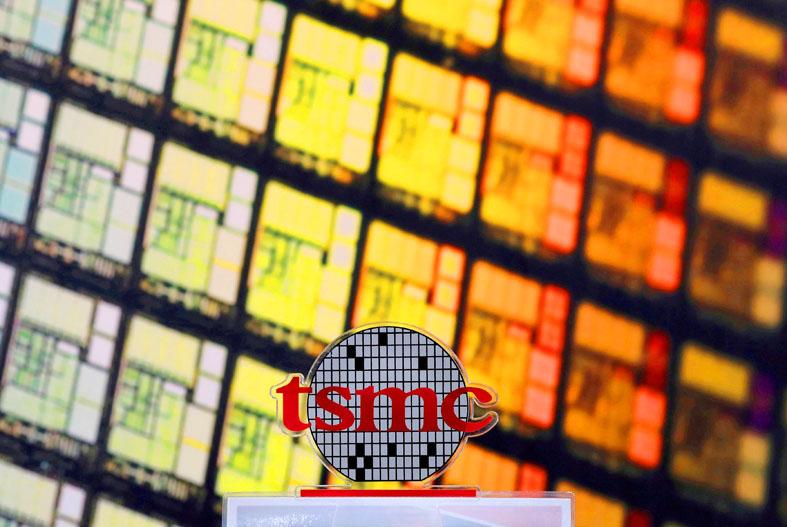Samsung Electronics Co is considering a second location in Texas for its planned US$17 billion US semiconductor plant, a signature project that could address US concerns about chip security while expanding its own capabilities.
The South Korean company is exploring another 6 million square feet (557,418m2) site apart from a previously disclosed expansion of its Austin base, according to documents filed with the local government. If it goes ahead, Samsung would begin construction at the Williamson Country site in the first quarter of next year, with production expected to commence in the final quarter of 2024.
Samsung is weighing options for an advanced chipmaking plant in the US, in hopes of winning more US clients and narrowing the gap with industry leader Taiwan Semiconductor Manufacturing Co (TSMC, 台積電).

Photo: Reuters
The company had been in discussions to build a facility in Austin, Texas, capable of fabricating chips as advanced as 3 nanometers, people familiar with the matter have said.
Dubbed Project Silicon Silver, that plan included adding about 650,000m2 of new space to the Austin campus, where the company has had operations for decades. It called for investment of about US$17 billion and the creation of about 1,800 jobs over the first 10 years, according to an economic impact study prepared by a local consultant. Those objectives were echoed in the filing made public on Thursday for Williamson County, which is just north of Austin.
In a January filing, the company detailed a timeline for the Austin project that spanned breaking ground in the second quarter of this year, with production up and running by the fourth quarter of 2023.
It is also evaluating alternative sites in Arizona and New York, as well as in South Korea.
Samsung is taking advantage of a concerted US government effort to counter China’s rising economic prowess and lure back home some of the advanced manufacturing that over the past decades has gravitated toward Asia.
US President Joe Biden last month laid out a sweeping effort to secure the nation’s critical supply chains, including a proposed US$52 billion to bolster domestic chip manufacturing.
The hope is that such production bases in the US would galvanize local businesses and support US industry and chip design. Intel Corp’s troubles ramping up on technology and its potential reliance in the future on TSMC and Samsung for at least some of its chipmaking only underscored the extent to which Asian giants have forged ahead in recent years.
If Samsung goes ahead, it would effectively go head-to-head on US soil with TSMC, which is on track to build its own US$12 billion chip fab in Arizona by 2024.
Samsung is trying to catch TSMC in the so-called foundry business of making chips for the world’s corporations — a particularly pivotal capability given a deepening shortage of semiconductors.
Under Samsung family scion Jay Y. Lee, the company has said it wants to be the biggest player in the US$400 billion chip industry. It plans to invest US$151 billion through 2030 into its foundry and chip design businesses, aiming to catch TSMC by offering chips using 3-nanometer process technology next year.

The US dollar was trading at NT$29.7 at 10am today on the Taipei Foreign Exchange, as the New Taiwan dollar gained NT$1.364 from the previous close last week. The NT dollar continued to rise today, after surging 3.07 percent on Friday. After opening at NT$30.91, the NT dollar gained more than NT$1 in just 15 minutes, briefly passing the NT$30 mark. Before the US Department of the Treasury's semi-annual currency report came out, expectations that the NT dollar would keep rising were already building. The NT dollar on Friday closed at NT$31.064, up by NT$0.953 — a 3.07 percent single-day gain. Today,

‘SHORT TERM’: The local currency would likely remain strong in the near term, driven by anticipated US trade pressure, capital inflows and expectations of a US Fed rate cut The US dollar is expected to fall below NT$30 in the near term, as traders anticipate increased pressure from Washington for Taiwan to allow the New Taiwan dollar to appreciate, Cathay United Bank (國泰世華銀行) chief economist Lin Chi-chao (林啟超) said. Following a sharp drop in the greenback against the NT dollar on Friday, Lin told the Central News Agency that the local currency is likely to remain strong in the short term, driven in part by market psychology surrounding anticipated US policy pressure. On Friday, the US dollar fell NT$0.953, or 3.07 percent, closing at NT$31.064 — its lowest level since Jan.

The New Taiwan dollar and Taiwanese stocks surged on signs that trade tensions between the world’s top two economies might start easing and as US tech earnings boosted the outlook of the nation’s semiconductor exports. The NT dollar strengthened as much as 3.8 percent versus the US dollar to 30.815, the biggest intraday gain since January 2011, closing at NT$31.064. The benchmark TAIEX jumped 2.73 percent to outperform the region’s equity gauges. Outlook for global trade improved after China said it is assessing possible trade talks with the US, providing a boost for the nation’s currency and shares. As the NT dollar

The Financial Supervisory Commission (FSC) yesterday met with some of the nation’s largest insurance companies as a skyrocketing New Taiwan dollar piles pressure on their hundreds of billions of dollars in US bond investments. The commission has asked some life insurance firms, among the biggest Asian holders of US debt, to discuss how the rapidly strengthening NT dollar has impacted their operations, people familiar with the matter said. The meeting took place as the NT dollar jumped as much as 5 percent yesterday, its biggest intraday gain in more than three decades. The local currency surged as exporters rushed to